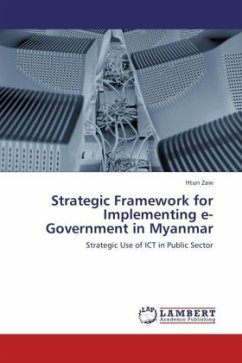Strategic use of ICT has been viewed as an essential vehicle for socioeconomic development of a country nowadays. Most governments in developing countries have made remarkable strides in implementing ICT-based strategies, particularly e-Government projects, to improve the quality and efficiency of public services, strengthen intra-government information flows, promote accountability and transparency, procure goods and services fairly and efficiently, encourage citizens participation in decision making processes, and inform citizens about government operations and services. While potential opportunities offered by e-Government are numerous, a comprehensive and coherent e-Government strategy is an essential constituent for successful implementation of projects. It enables all agencies to work in a consistent way by treating the state as a single enterprise. Without clear vision and strategic plan, governments may have difficulty in identifying what they need to do or how to prioritize actions.
Bitte wählen Sie Ihr Anliegen aus.
Rechnungen
Retourenschein anfordern
Bestellstatus
Storno








